This is not similar to this post, because in python we have numpy to solve all the problems. I have made a code in c++ to find the intersection of hough lines.
vector<Point2f> new_intersection(vector<Vec2f> lines) {
vector<Point2f> intersections;
float m1, c1, m2, c2;
float x1, y1, x2, y2;
float dx, dy, dx1, dy1;
for (auto&& i : combinations(lines, 2)) {
Point pt;
float rho = i[0][0], theta = i[0][1];
Point pt1, pt2;
double a = cos(theta), b = sin(theta);
double x0 = a * rho, y0 = b * rho;
pt1.x = cvRound(x0 + 1000 * (-b));
pt1.y = cvRound(y0 + 1000 * (a));
pt2.x = cvRound(x0 - 1000 * (-b));
pt2.y = cvRound(y0 - 1000 * (a));
Point pt3, pt4;
float rho1 = i[1][0], theta1 = i[1][1];
double a1 = cos(theta1), b1 = sin(theta1);
double x01 = a1 * rho1, y01 = b1 * rho1;
pt3.x = cvRound(x01 + 1000 * (-b1));
pt3.y = cvRound(y01 + 1000 * (a1));
pt4.x = cvRound(x01 - 1000 * (-b1));
pt4.y = cvRound(y01 - 1000 * (a1));
dx = pt2.x - pt1.x;
dy = pt2.y - pt1.y;
m1 = dy / dx;
c1 = pt1.y - m1 * pt1.x;
dx1 = pt4.x - pt3.x;
dy1 = pt4.y - pt3.y;
m2 = dy1 / dx1;
c2 = pt3.y - m2 * pt3.x;
if (m1 == m2)
continue;
else{
pt.x = (c2 - c1) / (m1 - m2);
pt.y = m1 * pt.x + c1;
intersections.push_back(pt);
}
}
return intersections;
}
I have done this by using simple math formulas to find intersection between all the lines excluding parallel lines. Problem is this doesn't give all the correct intersections. Checkout original, hough and intersection points image below.
These are the intersection points i am getting
inter1: [-3345, 116]
inter2: [163, 177]
inter3: [-1527, 115]
inter4: [164, 87]
inter5: [163, 116]
inter6: [-2.14748e+09, -2.14748e+09]
Mathematically the formulas are correct and should give correct points.


